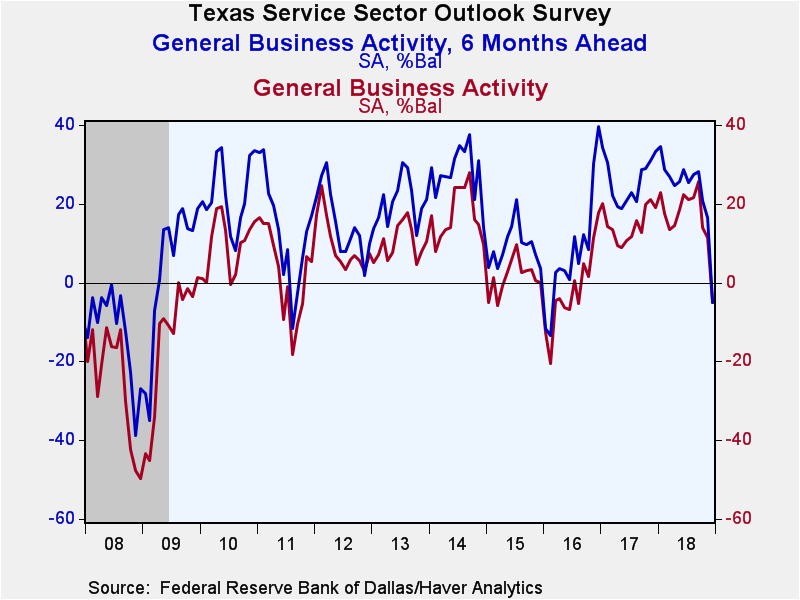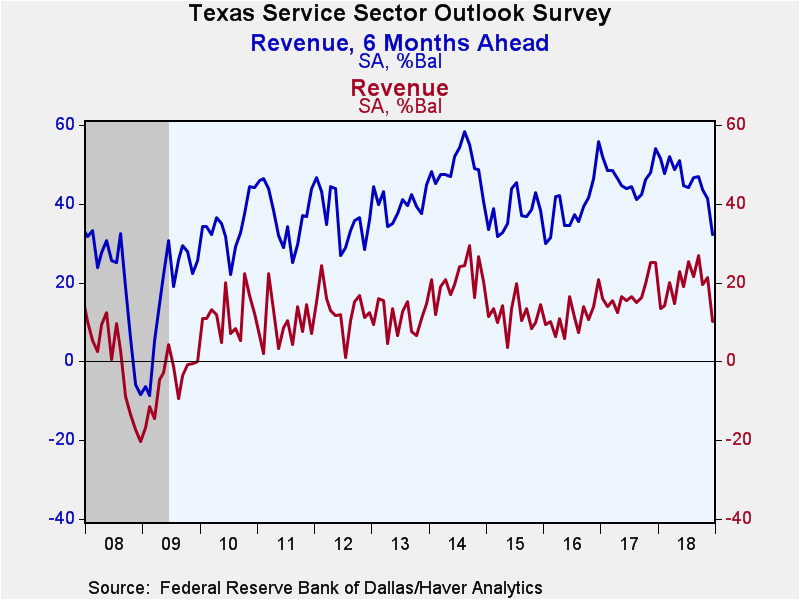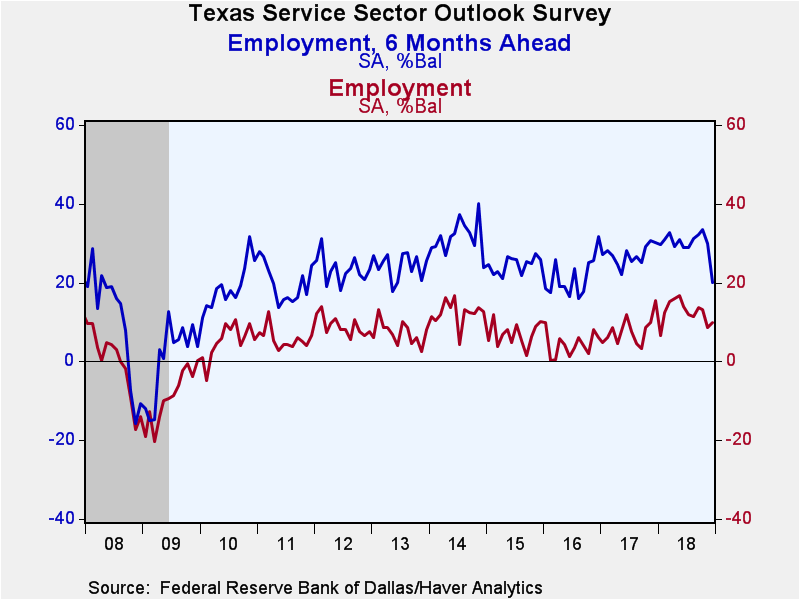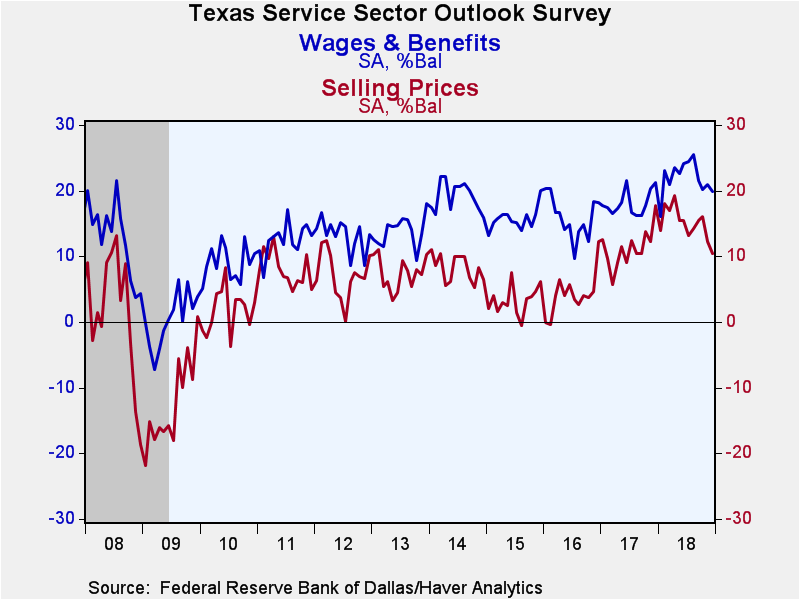 Global| Jan 02 2019
Global| Jan 02 2019Texas Service Sector Business Conditions & Outlook Deteriorate
by:Tom Moeller
|in:Economy in Brief
Summary
The Federal Reserve Bank of Dallas reported in its Texas Service Sector Outlook Survey that the General Business Activity Index declined to -5.0 during December from 11.4 in November. It was lowest level since August 2016 and below [...]
The Federal Reserve Bank of Dallas reported in its Texas Service Sector Outlook Survey that the General Business Activity Index declined to -5.0 during December from 11.4 in November. It was lowest level since August 2016 and below the 25.6 peak three months earlier. A lessened 14.0% of firms reported an increase in business activity, half the amount just three months earlier.
Lower revenue, wages & benefits and selling price indexes accounted for the decline, all of which were down sharply versus earlier highs. The employment measure improved slightly but was below its May peak. A lessened 17.0% of firms planned to increase employment versus 25.0% in April. The part-time employment reading also weakened. The wages & benefits measure eased to its lowest point since January and was well below the August high.
The selling prices index deteriorated to the lowest level in over a year, off sharply versus the high this spring. A lessened 17% of firms were raising prices, down from 23% twelve months earlier. Input prices also weakened.
The index of expected business conditions in six months also fell into negative territory for the first time since mid-2016 and was significantly below the peak three months ago. Expected revenue neared the February 2016 low and was well below the level twelve months earlier. Expected employment also deteriorated to a two-year low and was off sharply during the last three months.
The index of expected selling prices continued its sharp deterioration of the last twelve months. Thirty-eight percent of firms were planning to raise prices versus 44% twelve months earlier. An increased eight percent were lowering prices, the most in over two years. The future wages & benefits reading fell significantly and was well below the peak earlier this year.
Each index is calculated by subtracting the percentage reporting a decrease from the percentage reporting an increase. When all firms report rising activity, an index will register 100. An index will register -100 when all firms report a decrease. An index will be zero when the number of firms reporting an increase or decrease is equal. Items may not add up to 100% because of rounding. Data for the Texas Service Sector Outlook can be found in Haver's SURVEYS database.
| Texas Service Sector Outlook Survey (SA, % Balance) | Dec | Nov | Oct | Dec'17 | 2018 | 2017 | 2016 |
|---|---|---|---|---|---|---|---|
| Current General Business Activity Index | -5.0 | 11.4 | 14.1 | 19.1 | 16.5 | 14.7 | -2.0 |
| Revenue | 10.1 | 21.4 | 19.4 | 25.2 | 19.1 | 17.3 | 11.4 |
| Number of Employees | 9.9 | 8.7 | 13.1 | 15.5 | 12.5 | 7.8 | 4.3 |
| Wages & Benefits | 19.8 | 20.9 | 20.2 | 21.3 | 21.9 | 18.1 | 15.8 |
| Selling Prices | 10.5 | 12.2 | 16.1 | 17.8 | 15.0 | 11.2 | 4.2 |
| General Business Activity Index Expected in Six Months | -5.0 | 16.6 | 20.9 | 33,3 | 23.6 | 25.9 | 7.7 |
| Revenue | 10.1 | 21.4 | 19.4 | 25.2 | 19.1 | 17.3 | 11.4 |
| Number of Employees | 9.9 | 8.7 | 13.1 | 15.5 | 12.5 | 7.8 | 4.3 |
| Wages & Benefits | 19.8 | 20.9 | 20.2 | 21.3 | 21.9 | 18.1 | 15.8 |
| Selling Prices | 29.4 | 31.7 | 33.6 | 40.4 | 35.3 | 28.3 | 22.1 |
Tom Moeller
AuthorMore in Author Profile »Prior to joining Haver Analytics in 2000, Mr. Moeller worked as the Economist at Chancellor Capital Management from 1985 to 1999. There, he developed comprehensive economic forecasts and interpreted economic data for equity and fixed income portfolio managers. Also at Chancellor, Mr. Moeller worked as an equity analyst and was responsible for researching and rating companies in the economically sensitive automobile and housing industries for investment in Chancellor’s equity portfolio. Prior to joining Chancellor, Mr. Moeller was an Economist at Citibank from 1979 to 1984. He also analyzed pricing behavior in the metals industry for the Council on Wage and Price Stability in Washington, D.C. In 1999, Mr. Moeller received the award for most accurate forecast from the Forecasters' Club of New York. From 1990 to 1992 he was President of the New York Association for Business Economists. Mr. Moeller earned an M.B.A. in Finance from Fordham University, where he graduated in 1987. He holds a Bachelor of Arts in Economics from George Washington University.
More Economy in Brief
 Global| Feb 05 2026
Global| Feb 05 2026Charts of the Week: Balanced Policy, Resilient Data and AI Narratives
by:Andrew Cates










